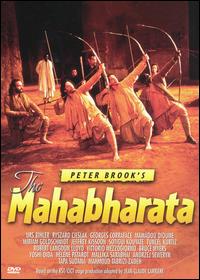
The Mahābhārata is one of the two major Smriti texts and Sanskrit epics of ancient India revered in Hinduism, the other being the Rāmāyaṇa. It narrates the events and aftermath of the Kurukshetra War, a war of succession between two groups of princely cousins, the Kauravas and the Pāṇḍavas.

Peter Stephen Paul Brook was an English theatre and film director. He worked first in England, from 1945 at the Birmingham Repertory Theatre, from 1947 at the Royal Opera House, and from 1962 for the Royal Shakespeare Company (RSC). With them, he directed the first English-language production in 1964 of Marat/Sade by Peter Weiss, which was transferred to Broadway in 1965 and won the Tony Award for Best Play, and Brook was named Best Director. He also directed films such as an iconic version of Lord of the Flies in 1963.

Duryodhana, also known as Suyodhana, is the primary antagonist in the Hindu epic Mahabharata. He was the eldest of the Kauravas, the hundred sons of the king Dhritarashtra and his queen Gandhari.
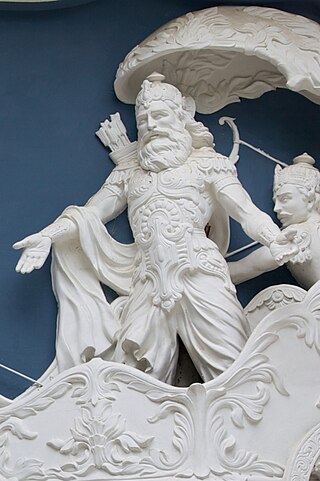
Bhishma, also known as Pitamaha, Gangaputra, and Devavrata, is a major character of the epic Mahabharata and the protagonist of the Bhishma Parva episode. He was the supreme commander of the Kaurava forces during the Kurukshetra War of the epic. He was the only character who witnessed the entirety of the events of the Mahabharata, beginning from the reign of his father, King Shantanu of the Kuru kingdom. Bhishma was the stepbrother of Vyasa, the grandfather of both the Pandavas and the Kauravas. He was a prominent statesman of the Kuru Kingdom. He was born as the youngest son of the illustrious King Shantanu and goddess Ganga.
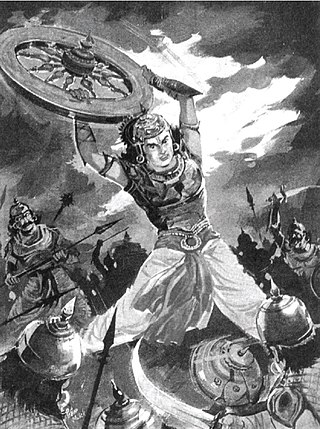
Abhimanyu is a warrior in the Hindu epic Mahabharata. He was the son of Arjuna and Subhadra, the younger sister of Krishna. Abhimanyu is portrayed as a young, strong and talented warrior. He was also one of the few individuals, along with his father, who knew the technique to enter the Chakravyuha, a powerful military formation.

Gandhari is a prominent figure in the Hindu epic the Mahabharata. She was a princess of Gandhara Kingdom and the wife of Dhritrashtra, the blind king of Kuru. She is depicted with a blindfold, which she wore in order to live like her blind husband. Due to divine boons, she became the mother of a hundred sons, the Kauravas, who are the primary antagonists of the epic. She also had a daughter named Duhsala. Following the Kurukshetra War and the end of her hundred sons, Gandhari cursed the god Krishna, leading to the destruction of the legendary Yadu Dynasty.
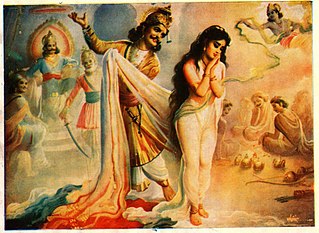
Dushasana, also spelled Duhshasana, Dussasana or Duhsasana, also known as Sushasana, is an antagonist in the Hindu epic Mahabharata. He was second eldest among the Kaurava princes and the younger brother of Duryodhana. Dushasana's jealousy and herd mentality were the two qualities said to have led to his downfall in the Mahabharata.

Dhritarashtra was a Kuru king, and the father of the Kauravas in the Hindu epic Mahabharata. He was the King of the Kuru Kingdom, with its capital at Hastinapura. He was born to Vichitravirya's first wife, Ambika.

In the Hindu epic Mahabharata, King Shalya was the brother of Madri, and the ruler of the Madra kingdom. Skilled with the mace and a formidable warrior, he was tricked by Duryodhana to fight the war on the side of the Kauravas. He was encouraged to serve as the charioteer of Karna by Duryodhana. Shalya was an incredibly calm and deliberate fighter, his level-headedness and prowess in warfare making him a great warrior in spite of his slight build.
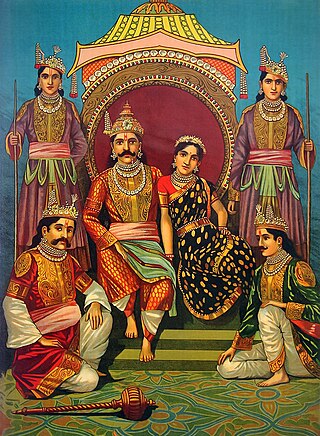
Yudhishthira also known as Dharmaraja, was the king of Indraprastha and later the Kuru Kingdom in ancient Indian History and the eldest among the five Pandava brothers, he is also one of the central figures of the ancient Hindu epic Mahabharata.
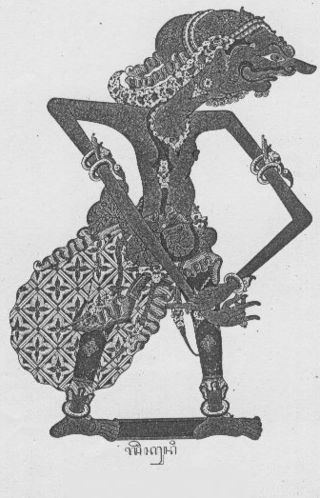
Shakuni is one of the antagonists of the Hindu epic Mahabharata. He was the prince of the kingdom of Gandhara when introduced, later becoming its king after the death of his father, Subala. He was the brother of Gandhari and the maternal uncle of the Kauravas.

Mahabharat is an Indian Hindi-language epic television series based on the ancient Sanskrit epic Mahabharata. The original airing consisted of a total of 94 episodes and were broadcast from 2 October 1988 to 24 June 1990 on Doordarshan. It was produced by B. R. Chopra and directed by his son, Ravi Chopra. The music was composed by Raj Kamal. The script was written by Pandit Narendra Sharma and the Hindi/Urdu poet Rahi Masoom Raza, based on the epic by Vyasa. Costumes for the series were provided by Maganlal Dresswala. The serial claims to have used the Critical Edition of Bhandarkar Oriental Research Institute as its basic source with Vishnu Sitaram Sukthankar and Shripad Krishna Belwalkar as its primary editor.
Sotigui Kouyaté was one of the first Malian Burkinabé actors. He was the father of film director Dani Kouyaté, of the storyteller Hassane Kassi Kouyaté and of the actor Mabô Kouyaté and was a member of the Mandinka ethnic group.

The Bhishma Parva, or the Book of Bhishma, is the sixth of eighteen books of the Indian epic Mahabharata. It has 4 sub-books and 124 chapters.

Mahabharat is a 2013 Indian mythological television series based on the Sanskrit epic Mahabharata. It aired from 16 September 2013 to 16 August 2014 on Star Plus. The series is available digitally on Disney+ Hotstar. Produced by Swastik Productions Pvt. Ltd, it starred Saurabh Raj Jain, Pooja Sharma, Shaheer Sheikh and Aham Sharma.

Mahabharat is a 2013 Indian Hindi-language animated film, directed by Amaan Khan and based on the Hindu epic of the same name. The film is produced by Kushal Kantilal Gada and Dhaval Jayantilal Gada. The film was a Christmas release on 27 December 2013. Several actors like Amitabh Bachchan, Sunny Deol, Ajay Devgn, Anil Kapoor, Manoj Bajpayee, Jackie Shroff, Vidya Balan, Deepti Naval were signed up for the characters in the film. It is touted as the most expensive animated film in Bollywood. The movie tells the story of the Indian epic Mahabharata. It received mixed reviews, with praise for its voice acting, but criticism for its animations.
The Mahabharata is a French play, based on the Sanskrit epic Mahābhārata, by Jean-Claude Carrière, which was first staged in a quarry just outside Avignon in a production by the English director Peter Brook. The play, which is nine hours long in performance, toured the world for four years. For two years the show was performed both in French and in English. The play is divided into three parts: The Game of Dice, The Exile in the Forest and The War. In 1989, it was adapted for television as a six-hour mini series. Later, it was reduced to about three hours as a film for theatrical and DVD release. The screenplay was the result of eight years' work by Peter Brook, Jean-Claude Carrière, and Marie-Hélène Estienne.

Suryaputra Karn is an Indian historical epic television series, which premiered on 29 June 2015 on Sony Entertainment Television (India) and Sony Entertainment Television Asia. The show aired Monday through Friday nights at 8:30 pm. Produced by Siddharth Kumar Tewary of Swastik Pictures, the series covers the life journey of Karna in the Mahabharata. The show starred Gautam Rode, Vishesh Bansal and Basant Bhatt as the lead character at various stages of his life.
Dharmakshetra is a fictional drama series which aired on the channel The EPIC Channel. The series is set in the aftermath of the battle of Mahabharata. The story is told from the perspective of the various characters as they are brought to the court of Chitragupta. All the episodes are available on streaming network EPIC ON.
